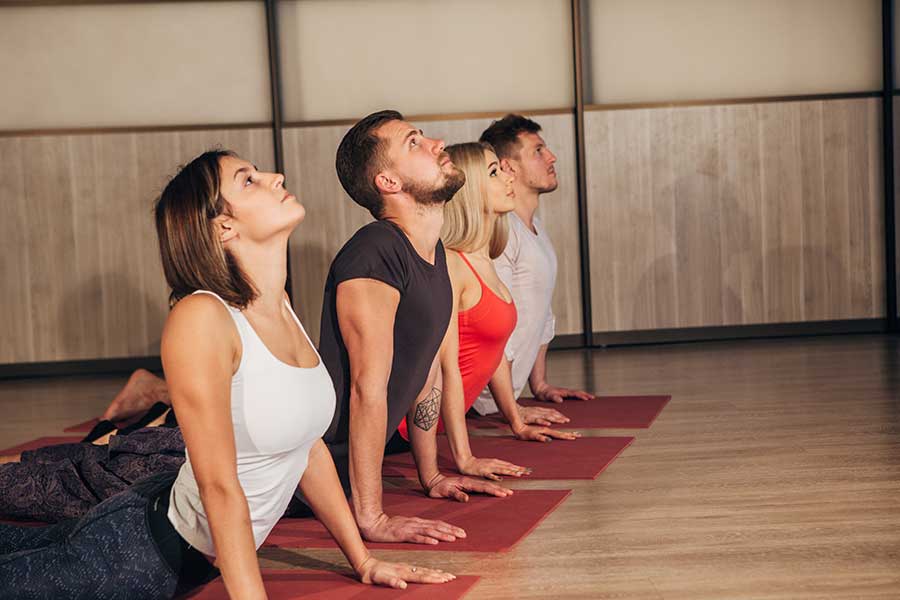More and more rehab facilities now in corporate yoga therapy into their menu of services. What is it about this practice that appeals to people recovering from a substance abuse disorder? Is it possible that the therapy assists with relapse prevention? Along the same lines, how does it help them to overcome the powerful cravings that accompany an addiction?
corporate yoga therapy into their menu of services. What is it about this practice that appeals to people recovering from a substance abuse disorder? Is it possible that the therapy assists with relapse prevention? Along the same lines, how does it help them to overcome the powerful cravings that accompany an addiction?
Yoga Therapy Offers Health and Fitness Benefits
Upscale rehab centers now offer facilitator-led yoga therapy group programs. At the heart of the fitness regimen is the participant’s ability to connect the mind and body. Suffering from an addiction and undergoing recovery is a stressful time. Yoga provides periods of relaxation through stress relief.
Breathing exercises all but force guests to slow down. They focus on proper breathing, which is the precursor to undertaking yoga activities. Because you don’t have to be fit, skinny, or flexible to do yoga, it’s an excellent choice for anyone. Every participant works with her or his body to improve core strength, balance, and posture.
The gradual process strengthens the individual. It makes it possible for someone to control the body in ways she or he never thought possible. Because yoga boosts concentration, it’s likely to enhance the ability to focus. Focus, in turn, is vital when dealing with stress during and after addiction treatment.
Forming a Growing Sense of Self-Awareness
Part of yoga therapy exercises is the combination of discipline with the ability to quiet the mind. Doing so is instrumental in reflecting on the discussions you may have had with a therapist. An example is cognitive behavioral therapy, which seeks to uncover negative patterns in behaviors, feelings, and thoughts.
Take the time during yoga therapy to reflect on the things you learn about yourself in other therapeutic settings. It’s an effective practice for personal growth. The trick to achieving a success that you can build on is the continued participation in the exercises.
However, remember that yoga is just as important as other fitness disciplines, but you may be more likely to stick with it. As you continue with the exercises, you get better at the moves and the ability to clear your mind. Before long, following the instructions of the facilitator is a breeze.
How Yoga Therapy Can Help Prevent Relapse
Yoga teaches you to relax your mind and body. In the past, you may have relied on chemicals to achieve an artificial form of relaxation. Now, you can use your meditation and concentration skills. This practice succeeds in reducing the perceived need for drugs.
But yoga’s relapse prevention success potential doesn’t stop there. Because breathing exercises, combined with physical moves boosts feelings of well-being, you can counteract bad moods. For many rehab program graduates, mood control is instrumental in preventing the emotional ups and downs that accompany drug cravings.
Yoga is Part of a Bigger Treatment Picture
Of course, yoga is only part of the experience. It complements other modalities that therapists rely on to affect healing. Examples include:
- An Integrated addiction treatment model that discusses functional living with an eye on hands-on instruction in relapse prevention
- Living in consciousness therapy helps program participants understand the unique role they play in their recovery
- Anger management provides the opportunity for participants to learn how to handle triggers and stressors
- One-on-one talk therapy forms the center point of recovery as it allows for a full customization of the experience
- Family program helps with the creation of a support network through the re-establishment of connections and trust
To get the full effect of the various therapies, it makes sense to check in for a residential treatment experience. In this scenario, you live at the facility and fully participate in all therapeutic exercises. A typical stay ranges from 30 to 90 days, which gives you a good amount of time to heal. During this period, guests work in close collaboration with experts in the field of addiction treatment to overcome their physical and psychological dependency.
When you’re ready to quit using, there’s help available. The expert therapists at Healing Springs Ranch want to collaborate with you. You don’t have to continue suffering from an addiction problem. Dial 866-656-8384 now for immediate assistance.
